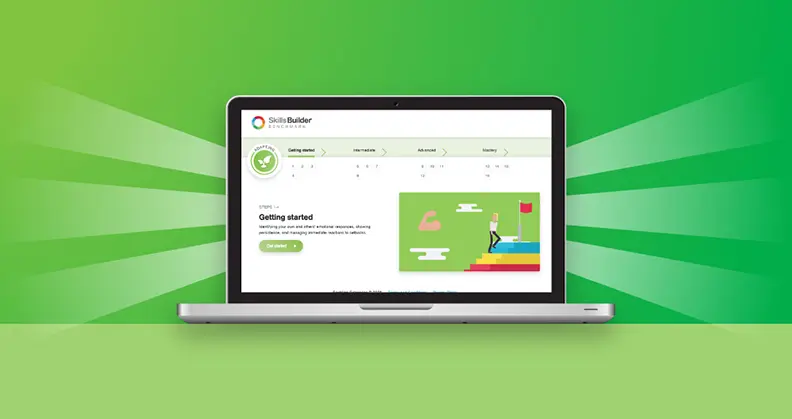Pelham Primary School in Wimbledon have been working with us since 2014, building essential skills from Nursery all the way to Year 6. We spoke to Emma Greer, Deputy Head Teacher at Pelham Primary, to get her perspective on the importance of building essential skills.
Teaching effective strategies for skills like Teamwork and Creativity with primary students can be tricky. Teachers overwhelmingly agree that schools need to be doing more to teach them explicitly, but it can be difficult to know where to start. That’s where the Skills Builder Framework comes in. It helps to keep it simple by making sure everyone is on the same page about what’s being learned.
‘It’s incredibly helpful’, says Emma Greer, Deputy Head Teacher at Pelham Primary. ‘Children from a very young age are being taught these skills, and are able to both talk about and identify them.’ By using a consistent structure for all skills learning, everybody can be working towards the same ultimate goals; the Framework has become ‘a common language which has woven itself through our wider curriculum.’

One of our key principles for effective skills education is to start young, and keep going. It can be tempting to see these skills as most important when students leave school and acquire a career, and so relegate explicit skills education to the final years of learning. But starting early allows students the time to become truly familiar with these skills, providing space for them to master each step in turn. ‘They are able to develop and grow,’ says Emma, ‘as they continually work on the skills and recognise them in others.’
Learning essential skills while at school unlocks learning in the classroom, too: Emma points out that skills like Staying Positive, for example ‘promote a resilient attitude towards not just learning, but life.’
If you’re building students’ essential skills all through their school career, it’s crucial to measure it. Tracking progress against the Skills Builder Framework is quick and easy with our online assessment tool, and we also provide offline self-assessment documents for use in the classroom. Keeping an eye on students’ strengths and weaknesses in this way makes it much easier to plan next steps.

Once you have a handle on which steps of each skill need development, staff must help students to keep practising them. One of the best ways to get regular practice is to weave skills education into the standard curriculum. ‘Essential skills are displayed in each classroom,’ explains Emma, ‘and they’re referenced by teachers in many areas of the curriculum.’ The Skills Builder Hub provides a wide range of resources to help build skills in other subject areas – from Skill Passports to record examples of when students have used skills well, to Skill Handbooks that provide a host of activities that can be built into normal lessons. This integrated approach has been a big success at Pelham Primary: ‘From English to P.E. to Drama to Science,’ says Emma, ‘the skills are constantly being developed and honed.’
Alongside this, it’s vital to make dedicated time to focus tightly on specific skills. This allows students to actively develop new skill strategies that they can take into other parts of their lives. For example, the Skills Builder Hub provides short 10-minute video activities that are perfect for slotting into small periods of time – especially as they require no preparation.
A more substantial way to build skills explicitly is to run a Project – a set of lessons for in-depth teaching of essential skills, all based on the Skills Builder Framework and following project-based learning principles. This can be a fantastic way to engage students in learning skills: a recent example comes from students in Year 2, who made a film of their Doing Good Project.

Schools can also run a memorable Challenge Day – like Pelham Primary’s recent Operation Moonbase, where students from across the school used their essential skills to establish a new society on a distant moon. Over the course of the day, they built Teamwork, Aiming High and Creativity skills – all while having a huge amount of fun. Teachers and students even dressed up in space-themed costumes!
Events like this help to bring skills to life by providing a real-life context. Helping students to understand that these skills are for the real-world rather than simply abstract goals will motivate them and encourage them to take responsibility for their own growth. Another great way to do this is to embark on a Visit to a local Employer. We work with a massive range of partners from every industry – Oliver Wyman, for example, an international consultancy that Year 5 students from Pelham Primary recently visited to get a taste of the world of work. Experiences like this help students to see how the skills they develop in the classroom will be relevant beyond the school gates.
Emma sees the enormous impact all this has on the everyday work done by students: ‘We have seen, as a school, how the Projects and Challenge Days have enabled children to shine in skills like Leadership, Staying Positive, Teamwork, Creativity and Problem Solving. These skills are invaluable in so many areas of the curriculum.’





